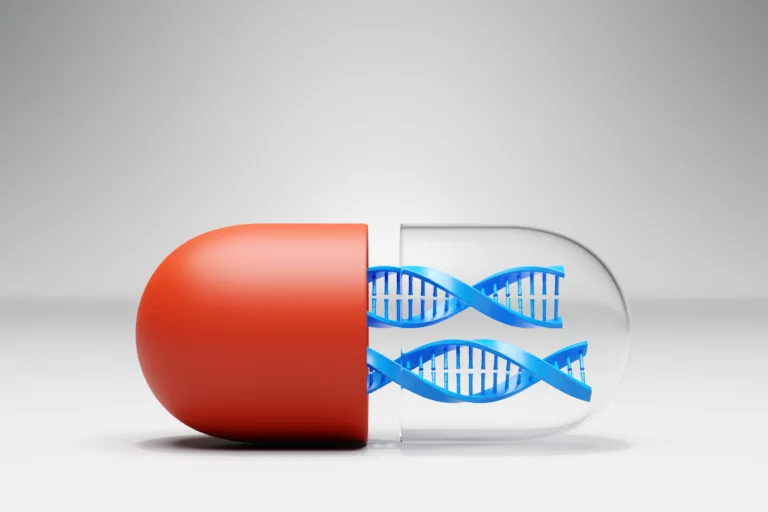In the realm of medical research, a novel domain has surfaced – “omics.” It encompasses the in-depth study of biological molecules, including genes, proteins, and metabolites. The aim is to delve into their form, function, and the way they interact.1 Within this domain, Pharmacogenomics stands out, focusing on how genes affect our response to medicine. This area is poised to radically alter the landscape of tailored healthcare. So, what truly defines “omics,” and where exactly does pharmacogenomics nestle within its scope?
1 Omics constitutes a broad spectrum of fields like genomics, transcriptomics, proteomics, and metabolomics. Together, these disciplines aim to offer a complete picture of biological mechanisms. Through the study of these molecules, scientists and healthcare providers uncover the intricate web of health and illness causations.1 Approaching health from a holistic angle could refine how we diagnose, treat, and prevent diseases. Ultimately, this could usher in a new era of healthcare, finely tuned to the needs of each individual.
1 At the heart of “omics” lies Pharmacogenomics. This discipline explores how our genetic code shapes our medicine responses. With insights into genes that influence drug effects and safety, pharmacogenomics aspires to improve treatment outcomes. It recommends the best drugs and doses for each person, taking their genetic uniqueness into account. Integrating pharmacogenomics brings us closer to providing care that’s truly personalized, marking a prime move towards precision medicine.

Key Takeaways
- Omics is a collective term that refers to the comprehensive study of various biological molecules, including genes, proteins, and metabolites.
- Pharmacogenomics is a branch of omics that focuses on how an individual’s genetic makeup affects their response to drugs.
- Pharmacogenomics aims to personalize drug therapy by selecting the most appropriate medication and dosage based on a patient’s unique genetic profile.
- The integration of pharmacogenomics into clinical practice is part of the broader shift towards personalized or precision medicine.
- Omics technologies, such as genomics, proteomics, and metabolomics, provide a holistic view of biological systems and have the potential to transform healthcare.
Introduction to Omics
Omics, a comprehensive term, delves into the exhaustive study of biological molecules. These include genes (genomics), proteins (proteomics), and metabolites (metabolomics). It aims to grasp their structure, function, and how they interact.2 This all-encompassing method elevates our comprehension of life’s molecular underpinnings. It enables exploration of the intricate interplay among different biomolecules. Further, it assists in understanding their effects on health and disease.
Definition and Scope of Omics
The diversity within omics spans across genomics, transcriptomics, proteomics, metabolomics, pharmacogenomics, and more.3 These scientific avenues provide an in-depth look into biological systems. Through such scrutiny, scientists uncover the complex dynamics between biomolecules. This exploration sheds light on their purposes in normal physiology, as well as their involvement in the onset and progression of diseases.
Importance of Omics in Understanding Life at the Molecular Level
Omic studies, by focusing on the molecular level, stand to transform healthcare strategies significantly. They promise advancements in disease diagnosis, treatment, and prevention by tailoring approaches to the individual.2 These technologies are quintessential in highlighting genetic, proteomic, and metabolomic factors affecting health. They drive the creation of personalized treatments and interventions, shaping the future of healthcare.
The gut microbiome draws special attention, outnumbering human cells 10 to 1. Its influence extends over digestion, immune function, and general health.2 Additionally, metabolomics assists in gauging medication efficacy by comparing a patient’s metabolic state to responses. This comparison facilitates the devising of tailored drug therapies.2
The intestinal microbiota boasts 150 times more genes than the human genome. It significantly influences drug metabolism, thus impacting drug effectiveness and safety profile individually.2 The fields of pharmacogenomics and nutrigenomics pivot on personal responses to drugs and nutrients. They hint at future drug labels featuring genetic indicators. These labels might cover dosing, drug effects, and genetic variations.
In summary, incorporating omics into clinical settings shows substantial potential. It aims to deepen our grasp of molecular life while enhancing the provision of tailored, precise medical care.
Pharmacogenomics: A Branch of Omics
Pharmacogenomics delves into how the genetic blueprint of an individual affects their drug response, considering both efficacy and the likelihood of adverse reactions.4 Its focus is on refining drug therapy, cherry-picking the most fitting drug and amount depending on a patient’s genetic uniqueness. This approach is designed to bolster treatment results and cut down on the risk of harmful drug responses.4
Concept and Significance of Pharmacogenomics
At its core, pharmacogenomics plays a pivotal role in the paradigm of personalized or precision medicine. It tailors medical decisions and care regimes directly to the individual, factoring in their genetic signature.4 The discernment of how genetic variances influence responses to medicines arms healthcare professionals with the insight needed to provide treatments that are both efficacious and safe, paving the way for superior patient outcomes.
Pharmacogenomics and Personalized Medicine
Integration of pharmacogenomics marks a significant step in the transition to personalized medicine, striving to adjust treatment to each patient’s distinct requirements.4 Such an approach targets enhancing treatment efficacy while mitigating adverse effects by tailoring drug choices and amounts to an individual’s genetic blueprint.
Examples of Pharmacogenomic Applications
Application-wise, pharmacogenomics showcases its power through examples like utilizing genetic tests to inform warfarin dosing and HLA-B*5701 variant screening to avert adverse reactions to abacavir, an HIV medication.4 These targeted drug therapy methods epitomize how pharmacogenomics can elevate patient care and security.
Historical Perspective on Pharmacogenomics
The emergence of pharmacogenomics as a scientific discipline dates back to the 1950s and 1960s, marked by the observation of hereditary variations in drug responses. This pioneering era saw the revelation of genetic polymorphisms within drug metabolism enzymes. Notable are the debrisoquine/sparteine and thiopurine S-methyltransferase (TPMT) polymorphisms.5
Early Observations and Discoveries
Early studies pinpointed genetic influences on drug tolerance, with 1968 findings on antipyrine and dicumarol illustrating the primary role of genetics.5 Concurrently, research from the 1950s delineated the correlation between succinylcholine dosages and apnea duration, alongside statistical analyses of atypical cholinesterase levels in serum.5 In 1960, investigations on isoniazid highlighted the genetic impact on drug metabolism.5 This was followed in 1970 by studies on hydralazine’s atypical cholinesterase genes’ effects on hypertensive patients.5
Landmark Studies and Breakthroughs
A turning point in pharmacogenomics came through the identification and characterization of key genetic elements, coupled with the invention of genetic assays. This enabled the classification of patients vulnerable to adverse drug responses.4 The period spanning the 1990s and 2000s witnessed an explosion in research, supported by the Human Genome Project’s culmination and the proliferation of genomic analytic tools.6
The term ‘pharmacogenetics’ was born in 1959, attributed to Friedrich Vogel.6 In 1997, Marshall introduced ‘pharmacogenomics’.6
Omics Technologies and Pharmacogenomics
At its core, genomics delves into an organism’s entire genetic makeup. This interdisciplinary field is fundamental in pharmacogenomics, revealing how genetic variances shape drug responses.4 Proteomics, which meticulously examines proteins, further clarifies these influences. It sheds light on how these variances impact the function of both drug metabolizers and their targets.4 Meanwhile, metabolomics focuses on the study of small-molecule metabolites. Its purpose is to pinpoint biomarkers indicative of a patient’s drug response. This enables the crafting of treatments that are specific to an individual’s needs.4
The amalgamation of these realms, alongside detailed clinical data, is vital. It allows for a comprehensive understanding of how genes, proteins, and metabolites interact. These interactions significantly shape a patient’s reaction to drugs.4 Such a comprehensive methodology is key in enhancing drug therapy. It also works to decrease the chances of adverse reactions, aligning with the overarching objectives of pharmacogenomics.
Genomics and Pharmacogenomics
Genomics, exploring an organism’s complete genetic blueprint, underpins pharmacogenomics. Through the scrutiny of genetic variations, insights emerge on how an individual’s DNA affects drug responses.4 This insight is imperative for selecting the most effective medication and dosage. These choices directly better treatment outcomes and lower the risk of harmful drug reactions.
Proteomics and Pharmacogenomics
Proteomics, a discipline focusing on proteins, serves as a key ally to genomics in pharmacogenomic investigations. It delves into how genetic variations translate into the operation and role of drug-metabolizing enzymes and drug targets. As such, proteomics offers a deeper comprehension of the intricate biological processes guiding each individual’s response to medications.4 Utilizing this knowledge is transformative in devising precise and customized treatment approaches.
Metabolomics and Pharmacogenomics
The analytical field of metabolomics is indispensable in pharmacogenomics. By pinpointing biomarkers that mirror a patient’s drug responses, it guides researchers and practitioners in tailoring treatments to the patient’s unique metabolic fingerprint.4 This personalized approach enhances drug efficiency while also diminishing the occurrences of adverse reactions.
Integrating the various omics with clinical facts is indispensable for deciphering the genetic, metabolic, and proteomic factors influencing drug responses. This comprehensive strategy is at the heart of leveraging pharmacogenomics in the clinic. It helps healthcare professionals provide individualized and potent drug regimens.4 Indeed, this holistic approach is pivotal for the full realization of pharmacogenomics’ benefits in patient care.
Pharmacogenomic Variation and Drug Response
Genetic differences play a crucial role in how individuals respond to pharmaceuticals. They can alter a drug’s metabolism, target sensitivity, and the risk of adverse reactions.7 Specific genetic variants might heighten or lessen drug-metabolizing enzymes’ activity, thereby impacting a drug’s movement through the body and its effectiveness.7 Such variations can also sway a drug’s interaction with targets or transportation systems, changing not only its efficiency but also the likelihood of accompanying side effects.7
Observing unique genetic alterations in various populations underscores the role of ancestry and ethnicity in pharmacogenomics.7 For instance, considering factors like age, gender, body mass, diet, and concomitant medications, next to ethnic background, can predict around 60% of the dosing variability of warfarin in individuals.8 Similarly, a significant portion of the variance in warfarin response can be accounted for by both genetic and non-genetic elements.8
It is concerning that over 90% of currently utilized drugs lack dependable biomarkers for gauging effectiveness or minimizing severe adverse effects.8 The relevance of identified variant clinical outcomes through genome-wide studies remains obscure with no guarantees of direct causal links.8 More concerning is the unspecified potential for enhancing clinical result predictions using functional genomics in forthcoming research.8
Implementing Pharmacogenomics in Clinical Practice
Integrating pharmacogenomics into clinical practice is complex. Key challenges include integrating genetic data into electronic health records and creating user-friendly decision support tools. Additionally, the establishment of evidence-based clinical guidelines is crucial.9
Challenges and Strategies
To overcome these challenges, preemptive genetic testing has been proposed. This strategy involves determining patient genotypes prior to medication initiation. It is supported by the development of sophisticated computational tools. These tools aid in the analysis and interpretation of pharmacogenomic data.9
Ongoing Initiatives and Pilot Studies
Noteworthy initiatives, exemplified by the Clinical Pharmacogenetics Implementation Consortium (CPIC) and the Ubiquitous Pharmacogenomics (U-PGx) project, are under way. These efforts aim to formulate comprehensive guidelines and infrastructures for global pharmacogenomic integration into healthcare.9
Furthermore, pilot studies are ongoing. They evaluate the practicality and economic benefits of including pharmacogenomic data in patient care. The overarching objective is the enhancement of treatment efficacy. Simultaneously, such initiatives strive to mitigate the burden of adverse drug reactions.9

Omics and Future of Personalized Medicine
The landscape of personalized medicine is evolving rapidly, ushered forward by the integration of various omics data. This amalgamation spans genomics, proteomics, and metabolomics. It aims to offer an exhaustive understanding of each person’s biological composition. Such insights are pivotal in ascertaining the optimal response to pharmaceutical interventions. These strides are significantly reliant on advances in computational methodologies and robust decision support infrastructures.
These innovations play a pivotal role in the analysis and elucidation of the copious amounts of multi-omics data being amassed. They are instrumental in empowering healthcare practitioners to formulate treatment courses tailored to each patient.10 By employing these data-intensive methodologies, the scope of personalized medicine expands. Moving beyond the realm of individual gene-drug reactions, this new path endeavors to comprehend the intricate web of factors influencing drug reactions. It includes genetic predispositions, molecular pathways, and environmental circumstances.
Integration of Multi-Omics Data
The paradigm of personalized medicine is set to embrace a multi-omics approach. This will encompass not only genomics but also proteomics and metabolomics.10 This cross-sectional analysis promises a profound understanding of the interplay among various biomolecules. It is aimed at providing insights crucial for devising targeted and efficacious treatment modalities.
Computational Tools and Decision Support Systems
Progress in computational methodologies and decision support systems is indispensable. This advancement is essential for tackling the intricacies of the vast multi-omics datasets. It enables healthcare professionals to cherry-pick the most suitable treatment regimens for their patients.10 The integration of these tools into medical practice empowers clinicians. It allows them to offer treatments optimized for therapeutic efficiency and minimization of negative reactions.
Ethical, Legal, and Social Implications of Pharmacogenomics
The adoption of pharmacogenomics brings about deep ethical, legal, and social debates. It raises concerns over confidentiality, fair genetic testing access, and genetic bias issues.11 The protection of genetic data against misuse by entities like insurers or employers is under scrutiny.11
Differences in accessing pharmacogenomic testing and the bespoke treatments that follow could create a gap in medical care. This gap, especially evident amongst marginalized communities, contributes significantly to health inequality.11 About 21% of the health disparities are a result of socioeconomic factors.12 There’s also worry about a widening gap in health care availability and quality.11
Conversations and policy discussions are critical to overcome these issues and ensure the fair and mindful integration of pharmacogenomics in healthcare.11 It’s crucial to increase public awareness on the benefits and risks associated with this field.11
The introduction of pharmacogenomics in clinical settings is challenging and demands a team effort. It calls for collaboration between health experts, policymakers, and the public.11 Tackling the ethical, legal, and social repercussions of this field is key to its successful and just application. This is vital for the advancement of personalized medicine.11
Conclusion
Omics, especially pharmacogenomics, is poised to revolutionize healthcare through tailored, highly effective drug treatments.3 By identifying the best medication and dosage for each person, leveraging their genetic makeup, this strategy enhances therapy results while minimizing the chances of adverse reactions.3
The incorporation of pharmacogenomics into the clinical arena, nonetheless, presents formidable hurdles. These include the amalgamation of genetic data with digital health records and the creation of easily digestible decision aids.13 Nevertheless, progressive projects and preliminary investigations are laying a strong foundation for pharmacogenomics to become an indispensable element of individualized healing.13
Though promising, the application of pharmacogenomics doesn’t come without its share of ethical, legal, and societal issues. These must be intricately managed to warrant fair access and prudent deployment of the innovation. It is imperative that a unified effort among scientists, medical practitioners, legislators, and the populace persist to smoothly address these challenges and unlock pharmacogenomics’ complete healing potential, reshaping the care landscape. For more great articles check out our full blog.
Source Links
- https://www.ncbi.nlm.nih.gov/pmc/articles/PMC9167178/
- https://nursing.wayne.edu/ohr/j_pierce_introduction_to_omics_092220-opt.pdf
- https://www.ncbi.nlm.nih.gov/books/NBK202165/
- https://www.ncbi.nlm.nih.gov/pmc/articles/PMC8971318/
- https://www.ncbi.nlm.nih.gov/pmc/articles/PMC3894835/
- https://www.sciencedirect.com/science/article/abs/pii/S1359644611002571
- https://www.ncbi.nlm.nih.gov/pmc/articles/PMC5682947/
- https://genomemedicine.biomedcentral.com/articles/10.1186/gm394
- https://www.ncbi.nlm.nih.gov/pmc/articles/PMC7226704/
- https://newsnetwork.mayoclinic.org/discussion/mayos-new-omics-strategy-leaps-into-the-future/
- https://dromicslabs.com/implications-of-pharmacogenomics-a-critical-review/
- https://www.ncbi.nlm.nih.gov/pmc/articles/PMC4296905/
- https://pubmed.ncbi.nlm.nih.gov/27822524/





